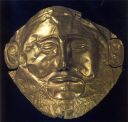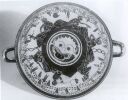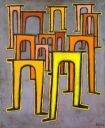Grasping Homer II

1
The Judgment of Paris & The Nature of Centaurs
Antoine Watteau,
considering marriage prospects for the young successor to the Sun King,
Louis XIV of France, about 1720, turns to Greek myth to visualize and
dramatize current events and and future prospects. Phidias, supervising
sculpture which which will inform Athenian governance in 450
bc, visualizes and
dramatizes the character and activities of centaurs.
Click for Judging
Paris


2
Shades of the Past
“Today I have looked upon the face of
Agamemnon”
Heinrich Schlieman, announced in 1875 fresh from his excavations at
Mycenae. A merchant experienced in travels, fluent in many languages,
Schliemann sensed from reading Homeric Greek that Troy and Argos were
historical sites, that Homer's legendary heroes lived in fact. His
excavations at Mycenae and later at Troy invited rereadings of Homer
attentive to historical particularities. Greek burial urns frequently
display scenes of mourning. Markers of graves, the hollow-bottomed urns
allowed offerings of wine to sink into ground. Shades below, momentary
refreshed with wine and its implied company, would speak again to living
suppliants. The Greek Anthology collects messages spoken in such
circumstances:
Here lies Timokritos:
soldier: valiant in battle.
Ares spares not the brave man, but the coward.
— Anakreon
The Greek Anthology
Click for Greek Anthology selections



3
Heroes
I am the tomb of a mariner shipwrecked.
Sail on:
Even while we died the others rode out the storm.
— Theodoridas of Syracuse,
The Greek Anthology
These words. rising from a watery grave,
identify the speaker as an adventurer, as one who faced adversity,
discovered self-reliance and the company of those who face death
together. Such an adventurer, perhaps Odysseus, still floats at sea on
the keel of his wrecked ship, as others drown, food for fish.
Venturesome sailors noting a cliff-top pyramid of stones marking the
burial site of a drowned sailor might appreciate the courage and costs
of the risk taker by sailing away from the rock ledge that might
undermine future ships. The hunting dogs converging on an antelope
offers a parallel message: hunter and hunted, man and animal, share the
ebbs and flows of mortal life. Odysseus after surviving such a
shipwreck, swims for days lost at sea, seeing at last a distant
shoreline. Nearer shore, he discovers too late the surf-lashed rocks
which threaten to pound him senseless. Thrust shoreward he grasps a rock
awaiting the backsurge which will pull him off. Pulled off, his arms,
legs, and torso appear as suckers, so fully did he hold to the rock.
Flowing freely about its home, the octopus shares with Odysseus the
exploration of water-worlds, the appreciation of retreat after the
pleasures of adventure. Creatures of many turnings, each survives
through adaptations to changing circumstances.
Click for Odyssey account

4
Songs

You are a human, therefore seek not
to foretell what tomorrow may bring,
nor how long one’s happiness may last.
For not even the flutter of the fly’s wings
is as fast as the changing of fortunes.
 Simonides, Threnos
Simonides, Threnos
Simonides' lament accompanied worthy dead,
the threnos (dirge) mirroring and animating the moods of those left
behind.
Simonides' experiences, together with his
songs, invite appreciation of actions which will ultimately fade.
Scopias, a powerful nobleman, had commissioned from Simonides a song of praise. Simonides' song praised not only Scopas, but
also the divine heroes Castor and Pollux, Scopas, seeing himself
discounted by the praise of Castor and Pollux, offered Simonides half
the agreed-upon payment, instructing Simonides to collect the other half
from Castor and Pollux. Receiving a message that two travelers wished to
speak to him outside, Simonides, looking in vain for the messengers,
felt the ground roll as an earthquake brought down the palace of Scopas,
burying all within. His absent visitors, apparently Castor and Pollux,
had rewarded him by removing him from the disaster.
Centuries earlier, the island of Thera, an
outpost of Crete, exploded, spreading volcanic ash which would block
sunlight, eventually destroying the civilization of Crete as well.
Centuries later, Athenian vases recollect the power of fate. Achilles
and Ajax, awaiting one more approaching battle, pass time with dice.
Athenians would know that Achilles shortly will die, the helmet and
shield behind him a prize to be bestowed on his successor as a leading
fighter. Crafty Odysseus, not the straightforward champion of forthright
arms, Ajax, receives recognition. Ajax, shamed and angry, plants his
sword in ground, preparing his suicide. Greeks appreciate less triumph,
more struggle.
Click for Greek Music


5

Developing Homeric Readings
Reading
sections of the Iliad should prepare you
for more efficient, more
energetic and more productive further reading, and should
inform your participation–
as a listener as well as a speaker–in discussion forums. Each week your approach
to
reading should develop, preparing you also
for your written account of one
passage
for your first
paper. Each week concentrate
on central texts, but also explore readings
in varied media.
Pandarus Strikes

Iliad IV ll 100ff (Fagles, p 148)
Stories
of the Trojan war abound, serving varying
interests and needs for readers inhabiting changing climates and
circumstances. How did early Greeks listening to Homer hear his
recitations? We may appreciate or discount characters, events and actions
in stories from times past, but understanding how stories suit the
circumstances understood by their audiences informs our judgments.
Can we
see what they saw? Can we see how they saw?
Before judging characters and actions in the Iliad, explore
the circumstances in which they work. What we see and how we see are also
dependent on the circumstances in which we work.
Click for Iliad Passages

Click for Iliad
Characteristics



6
Approaching Arts & Ideas
Paul Klee in the 1920s visualizes and dramatizes current events
demonstrating how modern readers can collectively shape future prospects.
His Twittering Machine incorporates mechanical circumstances consistent
with the influx of science and technology in our times. But each his song
also incorporates four individuals, distinctive in posture, gesture, and
quality of sound. As we conduct performances, turning the machine crank,
we can explore infinite variations on basic themes. Facing voices reduced
to unison through military training, we may find exercising such
variations all the more vital as conformity presses in. Klee's twitterers
face a designed landscape. Viaduct arches revolt, turning out from
uniformity, each distinctive in posture, shape, color and gesture. The
military march directing uniform actions fades as we join the active
company of viaducts, as we too pipe voicings, joining an experimental and
exploratory chorus.
Click to See Events

 a note of thanks for
keeping in touch
a note of thanks for
keeping in touch

